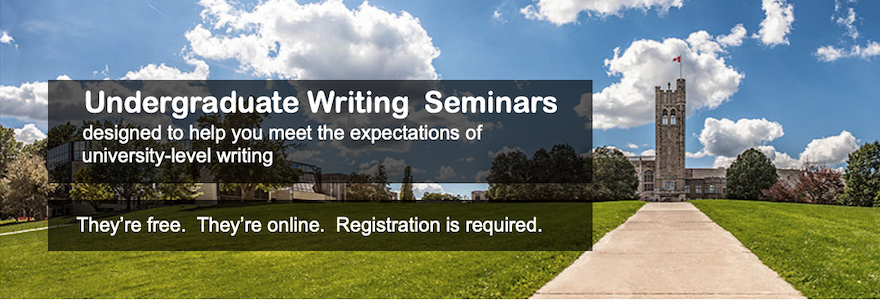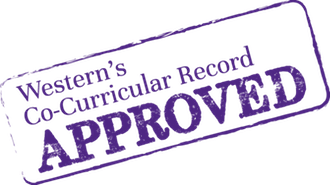Writing Seminars

Writing Seminars Online
Writing Support Centre seminars are directed toward undergraduate students but open to everyone in the Western community AND they are free. Our seminar series address approaches to common writing assignments,
Registration for Winter 2026 seminars is now open. Click on the links below to register. Contact us at wsc@uwo.ca if you have questions.
Click here to view the Winter 2026 Writing Seminar Schedule
Series 1 – Learning to Become a Scholar
- Transitioning from High School Writer to University Scholar January 19, 12:30
clarifies the specific expectations that your professors have for your work so that you will be better prepared for university-level writing. - Understanding and Planning Your Written Assignments January 20, 12:30
explains how to determine your professors' expectations for your work as well as how to use strategies like storyboarding to plan out your final product. - Referencing Your Paper January 21, 12:30
using examples from APA and MLA, presents citation as a necessary means of avoiding accusations of plagiarism, and as an approach to strengthening the credibility of the claims in your paper. - Overcoming Writer's Block January 22, 12:30
focuses on the different stages of the writing process and provides a more organized approach to keep you on track.
Series 2 – Writing Foundations: What Every Writer Needs to Know
- Writing More Clearly February 2, 11:30
What do your professors want? Clarity! - Concise Writing February 3, 11:30
demonstrates how to eliminate wordiness, condense information, and maintain meaningful content. - Crafting an Argument February 4, 11:30
demystifies this critical element of academic writing and demonstrates how to communicate the purpose of your paper clearly and concisely. Every paper requires aclear identifiable argument. - Editing and Proofreading February 5, 11:30
is a review of what to check before you submit your written work.
Series 3 – Disciplinary Writing: Writing for Your Audience
- Writing in the Social Sciences February 23, 11:30
addresses how to approach different types of writing assignments by breaking down complicated instructions. - Writing in the Arts and Humanities February 24, 11:30
demonstrates the role of critical consumption in the writing process and explores the organizational elements of an arts and humanities paper. - Writing in the Sciences February 25, 1:30
examines ways to write engaging scientific papers that audiences can comprehend. - Writing in Nursing and Health Sciences February 26, 1:30
explores ways to communicate complex health information to a wide audience, so not only academics but also the public can learn about issues vital to them.
Series 4 – I've Never Written That Before: Exploring Different Genres
- Annotated Bibliographies March 9, 11:30
explains the expectations and different steps involved in writing an annotated bibliography, including resources for citing. - Writing Essay Exams March 10, 11:30
focuses on how to organize useful study notes and make use of memory skills before exploring different exam structures. - Writing a Book Review March 11, 12:30
explains the purpose of a book review and how to evaluate the contributions of authors in terms of their credibility and the evidence they present. - Executive Summaries March 12, 1:30
are the gateway to business communication. No one will read your 80-page proposal if the exec summary is not persuasive. Learn how to write a concise, yet evocative, summary that perfectly pitches your idea.
Series 5 – Professional Writing: Writing That Will Take You Places
- Writing Resumes March 23, 1:30
You know the importance of a well-written resumé. Join us and learn how to highlight your vast experiences in a limited space. - Personal Statements March 24, 1:30
examines common pitfalls and explains how to connect with your intended audience. - Cover Letters March 25, 1:30
After joining our previous seminar, you have written a fabulous resumé. But don’t forget about the cover letter! In this session, you will learn to write a cover letter that brilliantly complements your resumé and that will get you noticed. - Letters of Intent March 26, 12:30
invite applicants to detail the agendas, academic or otherwise, they plan to pursue should they be offered admission into a program. This seminar explains the key components of each type of letter of intent.
Series 6 – Effective Presentations
- Slide Design March 30, 1:30
Visual communication is a crucial-- yet often overlooked-- aspect of delivering a dynamic presentation. In this session, we will explore how to craft an engaging PowerPoint slide deck. - Organizing Your Presentation April 1, 1:30
Have a high stakes presentation and want to organize your material for greatest impact? Join us for a session on how to create a presentation people want to hear.
If you do not see a seminar or workshop that addresses your writing needs or questions, let us know. Suggest a seminar or workshop topic: wsc@uwo.ca
WSC Seminars are Western Co-Curricular Record approved. To get credit you must attend four Seminars.


